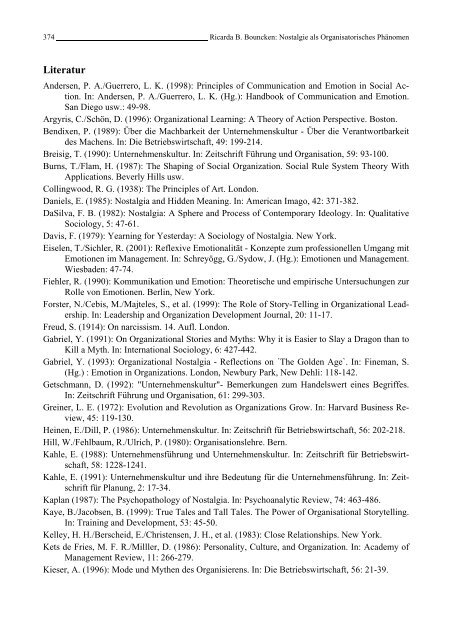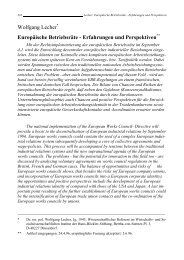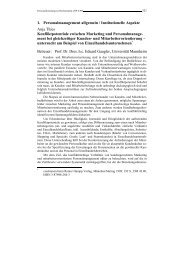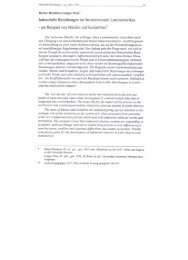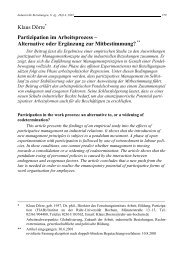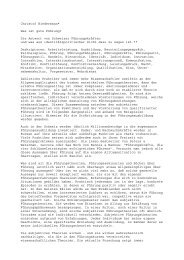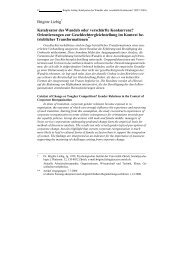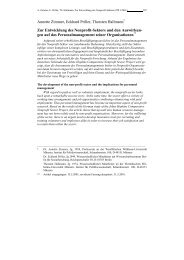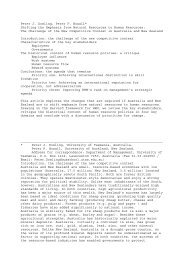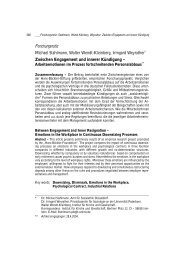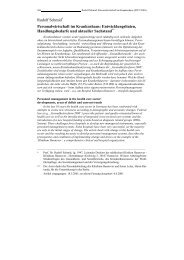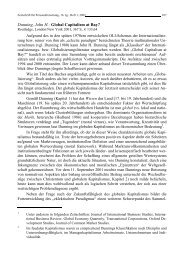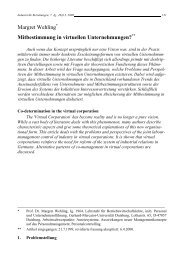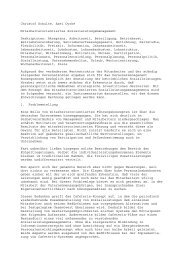Ricarda B. Bouncken - Rainer Hampp Verlag
Ricarda B. Bouncken - Rainer Hampp Verlag
Ricarda B. Bouncken - Rainer Hampp Verlag
Sie wollen auch ein ePaper? Erhöhen Sie die Reichweite Ihrer Titel.
YUMPU macht aus Druck-PDFs automatisch weboptimierte ePaper, die Google liebt.
374 <strong>Ricarda</strong> B. <strong>Bouncken</strong>: Nostalgie als Organisatorisches Phänomen<br />
Literatur<br />
Andersen, P. A./Guerrero, L. K. (1998): Principles of Communication and Emotion in Social Action.<br />
In: Andersen, P. A./Guerrero, L. K. (Hg.): Handbook of Communication and Emotion.<br />
San Diego usw.: 49-98.<br />
Argyris, C./Schön, D. (1996): Organizational Learning: A Theory of Action Perspective. Boston.<br />
Bendixen, P. (1989): Über die Machbarkeit der Unternehmenskultur - Über die Verantwortbarkeit<br />
des Machens. In: Die Betriebswirtschaft, 49: 199-214.<br />
Breisig, T. (1990): Unternehmenskultur. In: Zeitschrift Führung und Organisation, 59: 93-100.<br />
Burns, T./Flam, H. (1987): The Shaping of Social Organization. Social Rule System Theory With<br />
Applications. Beverly Hills usw.<br />
Collingwood, R. G. (1938): The Principles of Art. London.<br />
Daniels, E. (1985): Nostalgia and Hidden Meaning. In: American Imago, 42: 371-382.<br />
DaSilva, F. B. (1982): Nostalgia: A Sphere and Process of Contemporary Ideology. In: Qualitative<br />
Sociology, 5: 47-61.<br />
Davis, F. (1979): Yearning for Yesterday: A Sociology of Nostalgia. New York.<br />
Eiselen, T./Sichler, R. (2001): Reflexive Emotionalität - Konzepte zum professionellen Umgang mit<br />
Emotionen im Management. In: Schreyögg, G./Sydow, J. (Hg.): Emotionen und Management.<br />
Wiesbaden: 47-74.<br />
Fiehler, R. (1990): Kommunikation und Emotion: Theoretische und empirische Untersuchungen zur<br />
Rolle von Emotionen. Berlin, New York.<br />
Forster, N./Cebis, M./Majteles, S., et al. (1999): The Role of Story-Telling in Organizational Leadership.<br />
In: Leadership and Organization Development Journal, 20: 11-17.<br />
Freud, S. (1914): On narcissism. 14. Aufl. London.<br />
Gabriel, Y. (1991): On Organizational Stories and Myths: Why it is Easier to Slay a Dragon than to<br />
Kill a Myth. In: International Sociology, 6: 427-442.<br />
Gabriel, Y. (1993): Organizational Nostalgia - Reflections on ´The Golden Age`. In: Fineman, S.<br />
(Hg.) : Emotion in Organizations. London, Newbury Park, New Dehli: 118-142.<br />
Getschmann, D. (1992): "Unternehmenskultur"- Bemerkungen zum Handelswert eines Begriffes.<br />
In: Zeitschrift Führung und Organisation, 61: 299-303.<br />
Greiner, L. E. (1972): Evolution and Revolution as Organizations Grow. In: Harvard Business Review,<br />
45: 119-130.<br />
Heinen, E./Dill, P. (1986): Unternehmenskultur. In: Zeitschrift für Betriebswirtschaft, 56: 202-218.<br />
Hill, W./Fehlbaum, R./Ulrich, P. (1980): Organisationslehre. Bern.<br />
Kahle, E. (1988): Unternehmensführung und Unternehmenskultur. In: Zeitschrift für Betriebswirtschaft,<br />
58: 1228-1241.<br />
Kahle, E. (1991): Unternehmenskultur und ihre Bedeutung für die Unternehmensführung. In: Zeitschrift<br />
für Planung, 2: 17-34.<br />
Kaplan (1987): The Psychopathology of Nostalgia. In: Psychoanalytic Review, 74: 463-486.<br />
Kaye, B./Jacobsen, B. (1999): True Tales and Tall Tales. The Power of Organisational Storytelling.<br />
In: Training and Development, 53: 45-50.<br />
Kelley, H. H./Berscheid, E./Christensen, J. H., et al. (1983): Close Relationships. New York.<br />
Kets de Fries, M. F. R./Milller, D. (1986): Personality, Culture, and Organization. In: Academy of<br />
Management Review, 11: 266-279.<br />
Kieser, A. (1996): Mode und Mythen des Organisierens. In: Die Betriebswirtschaft, 56: 21-39.


